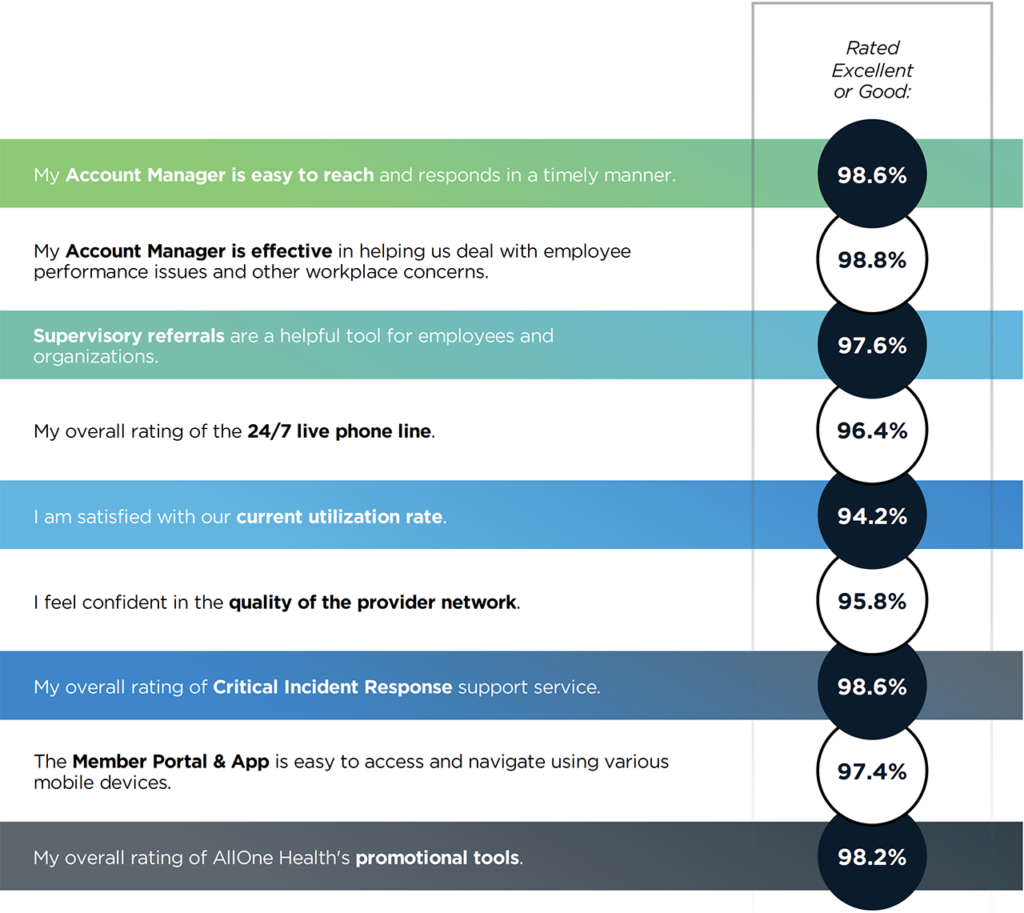An employee assistance program (EAP) is a workplace benefit that helps employees manage everyday challenges that could negatively impact work or life. Multiple studies have shown that EAP services are a win-win benefit. When employees have the support they need to manage life’s most common challenges, employers are more likely to have an engaged and productive workforce.
However, not all employee assistance programs are the same. If you are searching for the “best employee assistance programs Chicago,” it pays to consider the following tips:
Tip 1: Look for expanded EAP services
When employee assistance programs were first introduced nearly a century ago, their services focused on addressing alcohol abuse. Since then, EAPs have expanded their services to address mental health concerns and other types of substance abuse.
At AllOne Health, we fully understand that mental health remains one of the most critical issues of our time. However, we also recognize that mental health, physical health, and behaviors are all intertwined. And they’re greatly influenced by relationships, surroundings, workplace culture, and other aspects of life.
To meet the needs of today’s employees and employers, AllOne Health offers a whole health approach to benefits, with expanded services that include:
Short-term Counseling Sessions
Mental health counseling sessions can help employees and their family members manage stress, anxiety, grief, and depression, resolve conflicts, improve relationships, overcome substance abuse, and address a broad range of everyday challenges that interfere with work-life balance.
When an employee is overwhelmed by personal problems or work-related stress, they can’t perform their duties effectively. This can lead to decreased productivity, increased absences, safety issues, accidents, and perhaps workers’ compensation.
By supporting mental health, everyone benefits. Stronger employees lead to stronger families and stronger organizations while reducing workplace stress and employee turnover.
Life Coaching
A life coach has training in helping people achieve more by forming healthy habits, learning new skills, and tapping into self-motivation and accountability. With the guidance of a life coach, employees can reach new goals, manage life transitions, improve stress management, and become more effective and productive.
Life coaching can also help in intangible ways by helping people strengthen relationships, increase self-esteem, improve work-life balance, develop preventive care strategies, and live a more purposeful life. Life coaching can also strengthen organizational health by improving employee engagement, work performance, and workplace culture.
Financial Consultations
Left unaddressed, financial problems can negatively impact an employee’s mental health, physical health, and overall well-being. Financial consultations can help employees resolve financial issues by helping with budget coaching, financial planning, bankruptcy, homebuying, debt management, identity theft, retirement planning, and saving for college.
Legal Referrals
A legal consultant can help employees and their family members address a variety of legal matters, such as estate planning, wills, real estate, bankruptcy, divorce, custody agreements, elder care, elder abuse, and adoption.
Work-Life Resources and Referrals
Work-life specialists help employees obtain resources and referrals for child care, elder care, pet care, adoption, and other life issues. They can also help employees with special needs support, including referrals for education, enrichment activities, housing, transportation, and community resources.
Medical Advocacy
A medical social worker has specialized training in helping people navigate the healthcare system and can help people understand what’s included in their benefits package or health insurance plan. They can explain claims and coverage and help secure doctor referrals, medical equipment, transportation, and options for transitional care or discharge.
Tip 2: Look for Organizational Support
An AllOne Health employee assistance program (EAP) includes the services of an account manager who provides services to human resources and leadership teams in the form of unlimited telephone consultations. Account managers have the necessary education, clinical expertise, and organizational knowledge to help human resources, managers, and supervisors address employee job performance and boost morale and productivity. For example, account managers can advise supervisors on when to make “formal” and “informal” referrals to the employee assistance program. They can also help secure training programs to help employees with work-life balance, caregiving challenges, managing change, communicating effectively, overcoming compassion fatigue, avoiding burnout, navigating conflict, and promoting diversity, equity, and inclusion.
Account managers can be a tremendous resource for onsite critical incident support, also referred to as a Critical Incident Response (CIR) or Critical Incident Stress Debriefing (CISD). Account managers can help organizations and leadership teams cope with various critical incidents impacting the workplace, such as natural disasters, an employee’s illness or death, workplace violence, layoffs, or other onsite traumatic incidents. Account managers can also help organizations obtain crisis management support services.
Tip 3: Look for Easy Access and Human Connection, 24/7/365
With an AllOne Health employee assistance program (EAP), people can call their employee assistance program anytime, day or night, weekends and holidays, and reach a real human being. This free and confidential service is available to employees and their family members.
In most cases, callers work with an intake specialist, who will ask a series of questions and then refer the caller for short-term mental health sessions or some other solution-focused counseling, such as a legal or financial consultant or a work-life specialist. In some cases, callers may receive in-the-moment counseling services.
AllOne Health also provides access to an online member portal, which gives employees easy access to online resources. For example, employees can fill out and submit an online form to request counseling services or work-life support. They can also use the member portal to access the live chat feature, available weekdays from 8 a.m. to 5 p.m. ET.
Employees can also use the member portal to access thousands of articles, podcasts, and resources, including an online financial wellness center, health and lifestyle assessments, soft skills courses, tools for human resources professionals, marketplace discounts, and provider resource locators.
Many people have also developed preferences for how they receive counseling services. It’s helpful when an EAP offers in-person sessions, video sessions, phone sessions, live chat sessions, and asynchronous messaging (which allows an individual to pause and continue the conversation at their convenience).
Tip 4: Look for Ongoing Promotional Materials
When selecting an employee assistance program (EAP), look for a provider that offers a variety of promotional tools and resources to build employee awareness and engagement. For example, AllOne Health provides Insights, a monthly newsletter that discusses different topics related to whole health. It also provides two webinars each month produced by in-house clinicians.
Tip 5: Consider Customer Satisfaction Rates
Every year, AllOne Health asks its customers for feedback on its EAP services and presents these results in an Annual Report Card Summary. In our latest survey, 99.4% of our customers would recommend AllOne Health’s employee assistance program to others. Here are the other questions we asked our customers and how they rated us:

Finding the right employee assistance program for your organization can be challenging. When selecting or renewing an employee assistance program, it pays to look closely at what is being offered. Review contracts carefully, watch for added fees for services, and check employee utilization rates.
To help you learn more about the AllOne Health employee assistance program (EAP), please review these additional resources:
- 10 Questions to Ask Your EAP Provider | AllOne Health®
- EAP Program Guide: Everything You Need To Know | AllOne Health®
- 5 Ways to Increase EAP Utilization: How to Make Sure Your Employees Know About and Use Your Program | AllOne Health®
- 5 Benefits and Challenges of Employee Assistance Programs | AllOne Health®
For additional information or to request a free quote from our sales team, click here.


